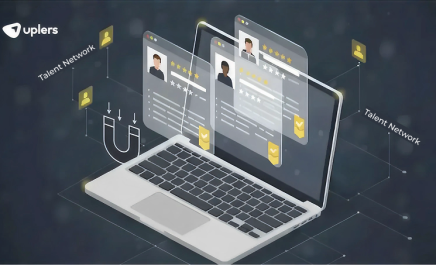Understanding Android Security: Essential Tips and Tricks
- Visruth Devadas
- July 29, 2024
- 6 Minute Read

Have you ever wondered what keeps your mobile app safe from hackers and malicious attacks? In an era where our smartphones are constantly connected and brimming with personal data, the security of Android apps is important.
As per recent research, mobile malware attacks have surged by 50% in the past year, with Android devices being the prime target of these attacks. With such alarming statistics, it’s clear that ensuring the security of your app isn’t just an option—it’s a necessity.
Developing a secure app is not just about adding features but about ensuring that user data remains protected from malicious threats. For hiring managers and development teams, understanding Android security is crucial in safeguarding against vulnerabilities and potential breaches.
Investing in robust security practices is critical to mitigating risks and ensuring reliable app performance. This blog will give you a detailed overview of how developers can enhance Android security, offering insights into common threats, essential security measures, and best practices.
Why Hiring Managers Need to Prioritize Security
Hiring managers play a crucial role in determining the security posture of their organization’s applications. By hiring developers who are well-versed in incorporating robust security measures, they can prioritize security and ensure the development of reliable and compliant Android applications.

Prioritizing security during the hiring process is vital for several reasons:
- Protecting User Data: Hiring managers should make sure developers know and follow best practices in securing user data from breaches and unauthorized access.
- Compliance with Regulations: Adhering to security standards and regulations is mandatory for many industries. A well-informed developer will ensure that the app meets these requirements.
- Mitigating Financial Risks: When there is a security breach, companies may suffer heavy financial losses. Hence, by employing security-oriented programmers, enterprises can minimize such incidents.
- Building Trust: A secure app fosters trust among users, which is essential for user retention and business growth.
Understanding Common Android Security Threats
Below are some common Android security threats that you must understand to develop effective solutions.
Malware and Viruses
Amongst Android applications, malware and viruses pose the biggest risk. Malicious software can steal personal data, damage devices, or disrupt services. With its open system, Android becomes susceptible to malware like ransomware, spyware, and trojans.
Developers need to know about these threats and take the necessary steps to prevent their apps from becoming platforms through which malware is distributed.
Data Breaches
Data breaches occur when unauthorized persons gain entry into private information storage areas. With Android apps, this could be achieved through insecure storage facilities or mishandling sensitive data while also having vulnerabilities within an application’s source code base itself.
Identity thefts, financial losses, and loss of user confidence can result from such incidents; hence, strong protective measures should be put in place against them.
Insecure Communication
This refers to transmitting data without enough protection by either sending over unsecured channels or failing to properly implement encryption.
Insecure communications can be easily intercepted and tampered with by attackers leading to potential security breaches. Every piece of information exchanged between the app & servers must always be encrypted to maintain a secure system environment.
Key Security Features in Android Development
Here are some key security features to ensure Android application security.

Secure Coding Practices
Secure coding practices are crucial for building strong Android applications that are not prone to hacking. This means writing codes resistant to common vulnerabilities like SQL injection, cross-site scripting (XSS), and buffer overflows, among others.
To minimize any risks related to security, developers need to follow best practices such as input validation, output encoding, and error handling techniques.
Use of Encryption
Encryption is an essential part of protecting data at rest or while in transit. For instance, sensitive information stored within Android apps must remain secure through the implementation of encryption methods.
Developers must ensure strong algorithms are employed for this purpose as well as managing encryption keys securely. Moreover, if a device gets lost or stolen, all data saved on it should be encrypted, hence preventing unauthorized access.
Application Sandboxing
To prevent data leakage & unauthorized access, each application’s code and data are isolated from other programs by Android’s sandboxing mechanism.
This means no app can view another app’s stored information without being granted explicit permission first. Designers and developers ought to utilize this capability so that they can create safe operating environments around their applications together with all associated files/data kept therein.
Essential Security Measures for Android Apps
Mentioned hereunder are some security measures you must incorporate for your Android app.
Secure Authentication and Authorization
Authentication and authorization are crucial app security components. Authentication checks the user’s identity, while authorization verifies their privileges.
Secure authentication implementation such as multi-factor authentication (MFA), together with proper authorization controls, ensures safety from unauthorized entry and possible security breaches.
Implementing SSL/TLS for Secure Communication
SSL (Secure Sockets Layer) alongside TLS (Transport Layer Security) are network protocols designed to ensure secure communications over untrusted networks.
By implementing SSL/TLS, developers can guarantee that data transmitted between an application and its servers is encrypted and thus protected against eavesdropping attackers. This is especially important when dealing with sensitive information like login credentials or financial transactions.
Regular Security Updates and Patch Management
Application developers must keep their apps updated with recent security patches since vulnerabilities keep being discovered from time to time.
Frequently updating an app coupled with applying necessary security patches helps in addressing known weaknesses besides guarding against emerging threats. Developers should also be checking on security advisories while integrating applicable updates into the code base of their respective applications.
Evaluating an Android Developer’s Security Skills
When interviewing Android developers, it is crucial to assess their understanding of security principles and practices. Key questions to consider include:

- What are some common security vulnerabilities in Android apps, and how would you mitigate them?
- How do you ensure that sensitive data is securely stored and transmitted in your app?
- Can you explain the importance of encryption and how you implement it in your applications?
- How do you stay updated with the latest security trends and vulnerabilities?
Reviewing Previous Work for Security Compliance
Examining a developer’s previous work can provide insights into their security practices. Look for evidence of secure coding practices, implementation of encryption, and adherence to security guidelines.
Reviewing past projects for security compliance helps gauge the developer’s expertise and commitment to building secure applications.
Certifications and Training in Android Security
There are various certifications and training programs that developers can take up to improve their skills related to Android application security. Some of these include Certified Secure Software Lifecycle Professional (CSSLP) and Certified Information Systems Security Professional (CISSP).
Additionally, there are specialized courses offered specifically to equip people with the knowledge necessary for securing Android apps. While hiring developers for your app, look for candidates who have completed such courses. Also, look for knowledge involving the use of AI and Machine Learning in Android app development to keep up with the modern app needs.
Outsourcing Android development to Indian platforms offers access to a vast pool of skilled and professional developers. India has a well-established IT industry with a strong focus on security practices and innovation.
By leveraging Indian platforms, businesses can find experienced developers who are proficient in the latest security standards and technologies. Indian developers often bring a global perspective and cost-effective solutions, making them a valuable asset for developing secure Android applications.
Best Practices for Maintaining App Security
Some best practices for maintaining Android app security are as follows:
Code Reviews and Security Audits
Regular code reviews and security audits are essential for maintaining app security. Code reviews involve examining the app’s codebase to identify potential vulnerabilities and ensure adherence to security best practices.
Use of Security Libraries and Tools
Security libraries and tools can enhance the security of Android applications by providing pre-built functionalities and protections. Libraries such as Google’s SafetyNet, OWASP’s Dependency-Check, and various cryptographic libraries offer valuable resources for securing apps.
Developers should incorporate these tools into their development process to bolster security and streamline implementation.
Continual Learning and Staying Updated with Security Trends
The field of cybersecurity is constantly evolving, with new threats and vulnerabilities emerging regularly. Developers must continually learn and stay updated with the latest security trends and best practices.
Attending security conferences, participating in training programs, and following industry news can help developers stay informed and maintain their expertise.
Wrapping Up
Understanding and prioritizing Android security is vital for developing safe and reliable applications. As cyber threats continue to grow, ensuring your app’s security requires attention to best practices and proactive measures. Key takeaways include:
- Adopting secure coding techniques to minimize vulnerabilities.
- Using strong encryption to protect data both in transit and at rest.
- Leveraging Android’s sandboxing to isolate app data.
- Keeping your app updated with the latest security patches.
By concentrating on these aspects, companies can protect user data, comply with regulations, and maintain user trust and a safe application environment. Skip the hassle of searching, vetting, and selecting the right candidate by finding one through us. Explore Uplers’ network of talented developers and hire Android developers to enhance your app’s security and achieve peace of mind.









